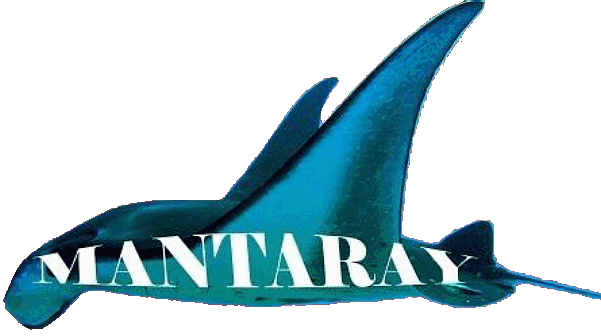|
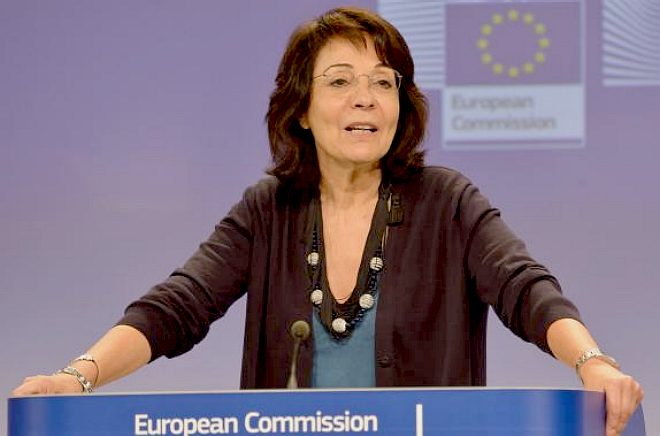
MARIA
DAMANAKI - The former EU commissioner for maritime affairs and
fisheries is at the
time or writing the Global Managing Director for Oceans at The Nature Conservancy.
Maria leads a global team focused on transforming how the world manages its oceans, including sustainable fisheries management, large-scale protection and restoration of coral reefs and other ecosystems, coastal resilience, and a first-of-its-kind mapping and quantification of the full value of the world’s oceans to people.
She believes that the only path to lasting, tangible results for a sustainable blue economy is collaboration across public, private and civil sectors – at both global and local levels – while always respecting the needs of both nature and people.
Reviewing her time as EU fisheries chief, she said:
“What I really take away from my five-year mandate at the European Commission is that change is possible in Europe today.
“It needs time and patience but my own experience with Europe is a success story of self-criticism and self-renewal.
“Change needed to happen in the Common Fisheries Policy. We had been over-fishing for too long.
“Fishing quotas have been set following economic interests for too long. We spent millions to build new, bigger fishing vessels for too long.
“With the (CFP) reform, we are seeing a change in culture. Today, we don’t discuss any more if we should go for sustainably fished stocks but when to go for it.
“There is a general consensus that we have to fish less if we want to continue fishing. This will, in the long run, benefit everybody. It will increase both the fish stocks and the income of our fishermen.
“If we achieve our goal to have all stocks fished sustainably by 2020, we are talking about 15million more tonnes of fish in the sea.
“This could mean 1.8billion euros (£1.4billion) more revenues in the catching sector alone.
“Better labelling and fresh, higher quality products will add to that.
“These radical changes were only possible because we got everyone around the table; governments, parliaments, civil society, industry local and regional actors.
“And also because we gave powers back to those who know their craft best, the stakeholders and regional actors of fisheries policy – the ones who are on the ground.
“I hope these will be the founding stones of a prosperous fisheries sector and to make it work,we need to support our fishermen.”
Maria is based in the Conservancy’s London office. She enjoys traveling and spending time around the Greek islands with her three grown children.
Maria Damanaki is the Global Managing Director for Oceans at The Nature Conservancy.
She leads a global team focused on how the world manages its oceans, including sustainable fisheries management, large-scale protection and restoration of coral reefs and other ecosystems, coastal resilience, and mapping and quantification of the full value of the world’s oceans to people. Maria
is a Greek politician, including former president of the Synaspismos party of the left and former state member of the Hellenic Parliament within the Panhellenic Socialist Movement (PASOK). She most recently served for four years as European Union Commissioner for Maritime Affairs and
Fisheries.
In her role as Commissioner, the EU was able to bring fish populations back to healthier
levels - from five sustainable stocks in 2010 to up to 27 in 2014. In just the next five years, the continuation of her fisheries policy efforts could lead to 15 million more tons of
fish in the sea, 30 percent more jobs in Europe and the equivalent of over US
$2 billion in additional revenue. She also introduced and implemented the Blue Growth agenda for Seas and Oceans in Europe, which aimed to create 1.6 million new jobs and the equivalent of US $750
billion in revenue by 2020 in sectors such as coastal tourism, ocean energy, and marine biotechnology. In addition, she established legislation to create a common framework for Marine Spatial Planning to map and better manage maritime activities across EU countries. 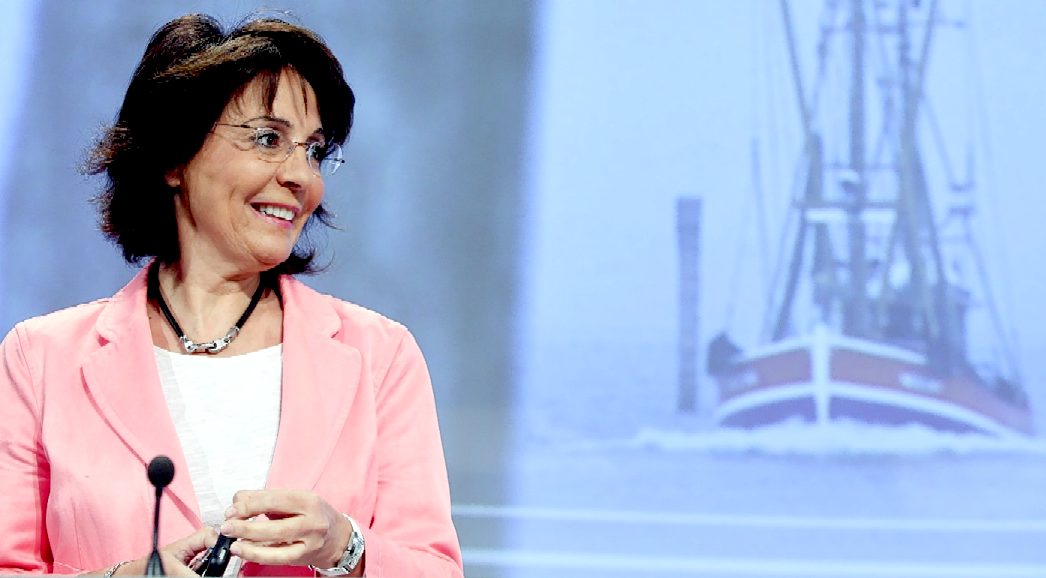
Damanaki was born in Agios Nikolaos, Crete, in 1952, and studied chemical engineering in the National Technical University of Athens. As a student, she became a member of the Communist Youth of
Greece, the youth section of the Communist Party of Greece (KKE), but also became actively involved in the
anti-dictatorial struggle and took part in the Athens Polytechnic uprising. Damanaki was the voice of the famous "Εδώ Πολυτεχνείο" ("This is the Polytechnic")
radio broadcast from within the uprising, calling Greek citizens out to support; she was arrested and tortured by the regime. From 1977 to 1993 she was consistently elected member of the Hellenic Parliament, first with the Communist Party and then with Synaspismos, the new party she became president of in 1991. This made her Greece's first female party president, preceded by being the first woman elected as Vice President of Parliament in 1986. She was a candidate for mayor of
Athens twice, in 1994, supported by Synaspismos, and in 1998, supported by both Synaspismos and PASOK; in the latter year she came second, defeated by Dimitris Avramopoulos, supported by the conservative party of New Democracy. In November 2009 she was nominated as the representative of Greece in the European Commission and on 27 November 2009 was elected as the Commissioner-designate for Maritime Affairs and Fisheries, serving from 2010 to 2014.
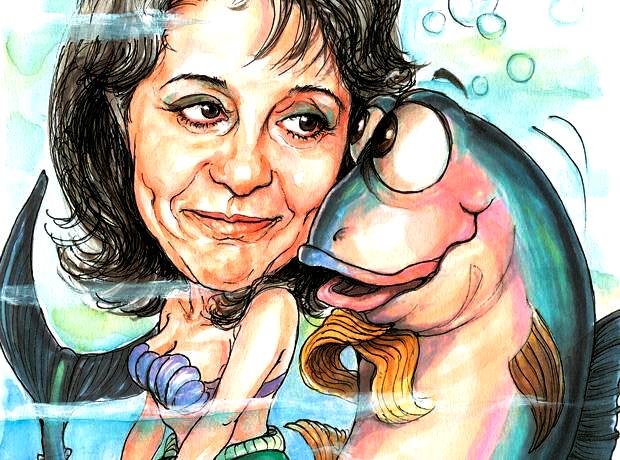
BRUSSELS
- Many would think that Maria's office in Brussels was poorly sited to be able to discuss fishing, tucked away in the European Commission’s HQ. It
was a good 70 miles from the nearest major fishing port, amid a skyline cluttered with concrete and glass. When critics complain about out-of-touch bureaucrats meddling with the EU fishing industry, they probably imagine them sitting in offices just like Damanaki’s.
It’s a different world, but one which Damanaki clearly approaches with a healthy sense of humour,
witness her abandoning the traditional photographs on her official website
in favour of a series of light-hearted cartoons. Maria is quoted as saying: “My portfolio - although it’s rather small - has a lot of interest in it,” she tells me. “It affects fishermen, consumers, labelling, external relations and internal relations, so it’s a challenge.” Damanaki likes a challenge. A one-time student activist, she was imprisoned in the 1970s for her opposition to the Greek dictatorship and became a figurehead of the popular uprising against the military junta after taking to the airwaves during a student revolt. Almost 40 years on, as protector of the EU’s lucrative fish stocks, she faces a different kind of enemy.“The enemy is our irresponsible behaviour, the enemy is the quick profit, the ‘let’s go there and fish everything’ idea, thinking that something magical will
happen at the end of the day and the fish are going to reproduce,” she
explains. “The enemy is this illusion that nature has unlimited resources.” JULY
2011 SPEECH - EUROPEAN FISHERIES REFORM
"Ladies and gentlemen,
I bring you news that today the Commission has adopted its set of proposals for a reformed Common Fisheries Policy.
Later this afternoon I will be presenting the package in detail to the European Parliament's Fisheries Committee. But I know there is a lot of interest - in the sector but also in public opinion - on our plans for recovery. So I am particularly happy to give you the main highlights of the reform – and explain the rationale behind our proposals.
First, let's look at the situation we are facing right now.
Our current system is not working in favour of sustainability. 75% of EU stocks are still overfished and a third of them are in a worrying state. Catches are only a fraction of what they used to be 15 or 20 years ago, and still dipping year after year: catches of cod, for instance, have declined by 70% in the last ten years. Our fleet is "obese" – and our efforts to slim it down with various incentives have been counterproductive.
The system does not work for the EU market either: Europe has to rely on imports for two-thirds of its fish. Consumers worry about waste levels and lack of proper information.
Does it work well for the sector? Hardly. Too many fleet segments live on low profits, depend on subsidies for survival and are vulnerable to outside factors such as an increase in fuel prices.
Nor does it work for governance: the policy has become such a mastodon that we can't adapt it quickly enough to different regions or different circumstances.
It is a centralised, top-down approach that forces EU institutions to deal with the nitty-gritty details every day and leaves very little leeway for Member States to decide practical implementation, let alone for the industry to take part in management decisions.
'Business as usual' is not an option. According to our modelling exercise, if no reform takes place, only 8 stocks out of 136 will be at sustainable levels in 2022. In other words, if we don't make structural changes to the way we do business now, we will loose one fish stock after the other, with a possible chain reaction for the ecosystem that is hard to predict.
And our industry will face even more economic pressure, particularly small-scale fisheries. We will loose more jobs, but not just in the fishing sector itself: also in the processing industry, in transport, port infrastructure, packaging and retail.
I want to break this vicious circle. I want fisheries to be a present and future source of wealth for fishermen, for coastal communities and for citizens. And I want to ensure that our activities do not harm our seas and oceans in the long run.
This is why today I am presenting a comprehensive overhaul of the policy: an articulate package including a Communication explaining the contents of the reform; a new Basic Regulation for fisheries; a new Common Market Regulation; and a Communication on the international aspects of the Common Fisheries Policy.
Each of these is entirely new and equally important. But the three key concepts underpinning them all are: Sustainability, Efficiency and Coherence.
Environmental sustainability means bringing all stocks to sustainable levels by 2015. We have committed to this at the Johannesburg UN World Summit in 2002, and the same principle is contained in the United Nations Law of the Sea and in our recent Biodiversity Strategy.
Maximum Sustainable Yield – MSY - means that we can keep fishing. But we have to manage each fish stock in such a way that we can get maximum fish production while still keeping the stock sustainable. With the reform, MSY becomes a legal obligation in all our acts.
A second thing we need to do for sustainability is stop waste: discards, which can amount to 60% of catches in some fisheries, undermine all our data collection efforts and are morally and environmentally unacceptable. So I propose to change the system so that all catches are landed and counted against quotas.
A third element of the sustainability focus is the ecosystem approach: the long-term plans for stock management that we have already started need to become the common denominator of all our fisheries. As new ecosystem information becomes available, it has to be fed into the plans.
MSY, a discard ban and the ecosystem approach will change the way we fish: but we also need to change our management set up – and improve Efficiency.
Today, by virtue of the new co-decision procedure, even the most detailed technical decisions - like: what mesh size can
fishermen use for their nets to fish prawns in the Golf de Gascoigne? – have to be taken at the highest political level in the European machinery.
And, worse: from year to year, fishing opportunities are set by Ministers, who are not really bound by clear long-term, forward-looking goals. They'd rather go home from the end-of-year Council with "good news" for their own constituencies– and that's understandable. Only, this is exactly what leads to the short-term approach that has been so detrimental to our fish stocks.
By contrast to that, I want to decentralize. For example, let's say that Parliament and Council set a long-term plan for a fish stock in the Golf de Gascoigne – a plan containing specific objectives to keep the fish stocks at MSY level.
The choice of instrument, or instruments' mix, is up to Member States, cooperating at regional level; what counts for us is that they do achieve the objective, not how they achieve it. The EU has to be the lighthouse, if you will, showing the way. Member States, regions and industry have to steer the ship - and avoid the rocks.
It is a more flexible form of management based on results rather than methods, and it goes to the advantage of Member States and regions, who have to deal with far less micro-management from Brussels and can better coordinate measures with the industry or, optimally, devise them together with the industry!
This is a crucial point, because I think that not involving operators sufficiently, not taking full advantage of their immense expertise and know-how, has been a mistake in the past. From now on, fishermen organisations must be and feel responsible for managing fish stocks jointly with us and with the national regulators.
One way that contributes to giving responsibility back to the industry as well as to sustainability is a more market-based system of access to fleets.
Tradable concessions have been introduced in many countries and proved effective in tackling overcapacity: for instance in Denmark the demersal fleet was slimmed down by 30% and the pelagic one by 50%. Norway, the U.S., Australia and New Zealand also show success with this approach.
Fishing Concessions give operators enough flexibility to implement the discard ban and adapt to quotas. If vessel owners are allowed to trade concessions they can obtain a tailored combination of quotas according to their actual fishing patterns; and they can even fine-tune that allowance in real time, during fishing operations, by leasing somebody else's concession so as to land all catches without breaking the law.
We propose tradability at national level only, and we propose safeguards to protect legitimate public policy concerns like preventing too many fisheries interests to be concentrated in the hands of a few. And the small-scale fleet will be exempt, to prevent it from being absorbed by bigger operators.
So we have regionalisation, result-based management and intelligent rights-based management to make us more effective. The third pillar, Coherence, simply means that all other instruments, from market organisation to financial support, must be aligned to the first two.
Proper labelling, for instance, is an essential aspect of this reform: I want consumers to make informed purchasing choices. I want to help them make sustainable choices. Consumers are part of this reform too, just like the sector, we can all play a part in making coherent choices for the future.
So we are improving both compulsory and voluntary labelling provisions to give much more precise information on product origin. All products, including canned and processed ones, will be subject to stricter rules.
We are also acknowledging the crucial role of seawater and freshwater aquaculture for our markets and communities. This activity has the potential to bring smart, inclusive and innovative growth to both coastal and inland areas and it deserves a prominent place in our legislation.
Here too, we will provide strategic guidelines at EU level, with common priorities and targets. Member States will set up multiannual plans to develop the industry, improve competitiveness and offer operators fair access to waters and space. We can surely produce more high quality farmed fish in Europe in the future than we do today.
Coherence also means that our actions at international level must match our domestic goals and commitments. Just as we have a responsibility vis-à-vis the consumers and the fishing sector, we also have a huge responsibility vis-à-vis rest of the world too. We should not forget the paramount role of our fleet working in the high seas under fishing agreements, which must be a model of sustainability, legality and good governance. And not only the EU fleet: the EU must work with its main partners to achieve this change globally.
And finally coherence means financing the transition with adequate financial support. I am fighting to obtain enough funds to shift to a modern system of management, promoting innovation, sustainability and smart and inclusive growth. The Commission has backed me. There is no reason why a balanced and modernised fisheries policy should not contribute to the EU2020 objectives.
I'm also using this opportunity to simplify things: all subsidies should be grouped under a single financial instrument. And a fail-safe system will prevent EU funds from helping overfishing, unsustainable practices or illegal fishing, whether directly or indirectly. Coherence means above all: no more perverse subsidies.
Ladies and gentlemen,
I have tried to sketch the design of the reform package, but obviously there is a lot more. I invite you to visit our website or attend our detailed briefing for more information.
One final point I want to make is that this reform also contains many elements which do not constitute legal requirements, but which are still important novelties: part of what we want to do is set in motion a process that will change people's mindsets and behaviours.
This is set to be a behavioural revolution as well as a legal revolution.
The reform of the CFP that we are starting today is no longer the exclusive prerogative of Fisheries Ministers or MEPs. It concerns fishermen, coastal populations, retailers, consumers and ultimately taxpayers.
Some countries are already ahead of us in adopting modern, sustainable policies that deliver good results for both the industry and the oceans. We can't afford to be left behind.
Today's proposals are a sound step forward. I sincerely hope that this is the birthday of a new, flexible and intelligent fisheries policy that is fit for today's environmental and economic challenges.
Europe needs more fish, more wealth and more jobs. We won't have that without profound change. These proposals can deliver that change." 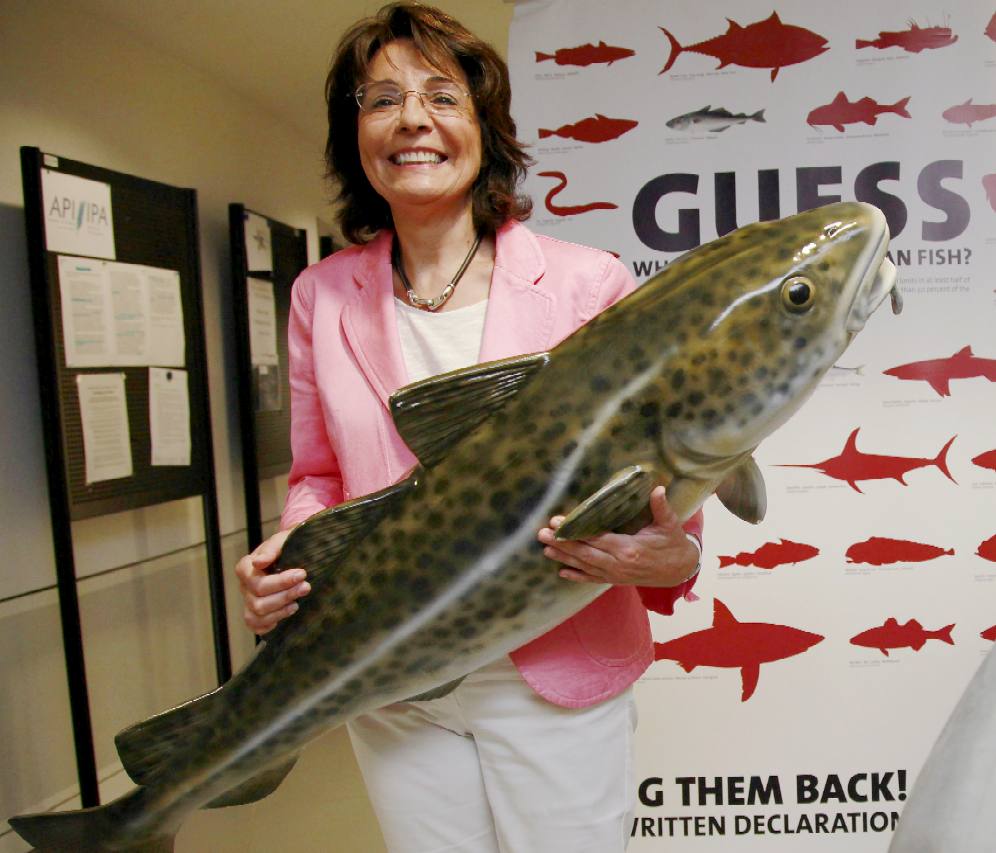
ECONOMIC
MADNESS - Without subsidies, most of the fishing businesses would fail. So thoroughly have industrial fleets
over-fished the seas that they couldn’t afford the fuel to travel the ever-increasing distance needed to catch the same amount of fish if their governments didn’t lavish public funds upon them. 
LINKS
& REFERENCE
The
Guardian 2011 europe-fisheries-reform-speech-maria-damanaki
twitter
maria damanaki
Twitter
Maria Damanaki
Nature
Conservancy Maria Damanaki global managing director oceans
European
Union commissioner_2010-2014
Maria Damanaki
The
grocer maria-damanaki-im-the-enemy-of-irresponsibility
Wikipedia
Maria_Damanaki
Telegraph
US-royal-tour-Prince-of-Wales-makes-plea-for-cleaner-oceans
Prince-of-Wales-speech-hrh-the-prince-of-wales-event-titled-plastic-the-marine-environment-scaling
Daily
Mail
Charles-horrified-toll-plastic-dumped-sea-Prince-Wales-plea-solve-issue-sake-future-generations
The
Guardian environment 2015 March 19
Prince-charles-calls-for-end-to-dumping-of-plastic-in-worlds-oceans
http://abcnews.go.com/US/wireStory/prince-charles-speaks-dangers-plastic-waste-oceans-29736519
Global
Ocean Commission
National
Geographic news 2014 June
Global-ocean-commission-report-high-seas-fishing-environment
Virgin
leadership and advocacy introducing global ocean commission
Wikipedia
European_Commissioner_for_Maritime_Affairs_and_Fisheries
Reuters
2013 US oceans new global group to clean up
National
Geographic 2014
global-ocean-commission-report-high-seas-fishing-environment
http://www.theguardian.com/environment/2011/jul/13/europe-fisheries-reform-speech-maria-damanaki
https://twitter.com/mariadamanakieu
https://twitter.com/damanaki
http://www.nature.org/newsfeatures/pressreleases/media/maria-damanaki-global-managing-director-oceans.xml
http://ec.europa.eu/archives/commission_2010-2014/damanaki/index_en.htm
http://en.wikipedia.org/wiki/Maria_Damanaki
http://www.thegrocer.co.uk/people/profiles/maria-damanaki-im-the-enemy-of-irresponsibility/229063.article
http://en.wikipedia.org/wiki/European_Commissioner_for_Maritime_Affairs_and_Fisheries
http://www.virgin.com/unite/leadership-and-advocacy/introducing-global-ocean-commission
http://www.scienceifl.com/ocean-plastic-pollution.htm
http://abcnews.go.com/US/wireStory/prince-charles-speaks-dangers-plastic-waste-oceans-29736519
http://www.globaloceancommission.org/
http://time.com/3750375/environment-prince-charles-oceans/
http://news.nationalgeographic.com/2015/03/150318-prince-charles-oceans-trash-plastic-britain/
http://en.wikipedia.org/wiki/Global_Ocean_Commission
http://www.itv.com/news/2015-03-18/prince-charles-makes-impassioned-plea-for-oceans-clean-up/
ACID
OCEANS - ARCTIC
- ATLANTIC - BALTIC
- BERING
- CARIBBEAN - CORAL - EAST
CHINA - ENGLISH CH
GULF
MEXICO
- GOC - INDIAN
- MEDITERRANEAN -
NORTH SEA - PACIFIC
- PERSIAN GULF - SEA
JAPAN - STH
CHINA
PLANKTON
- PLASTIC
- PLASTIC
OCEANS - UNCLOS
- UNEP
- WWF
|





